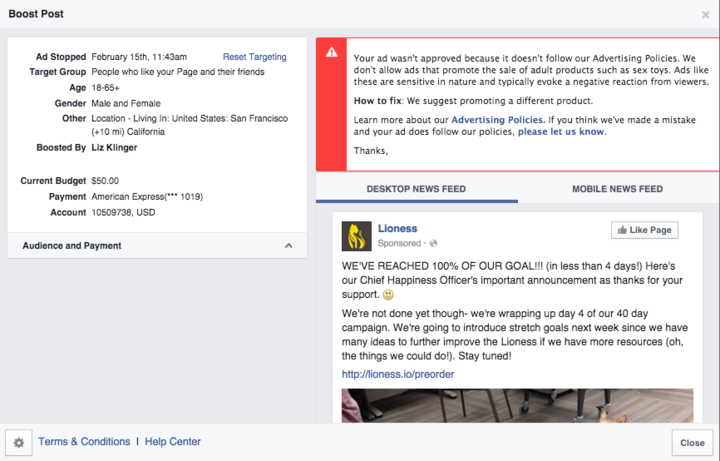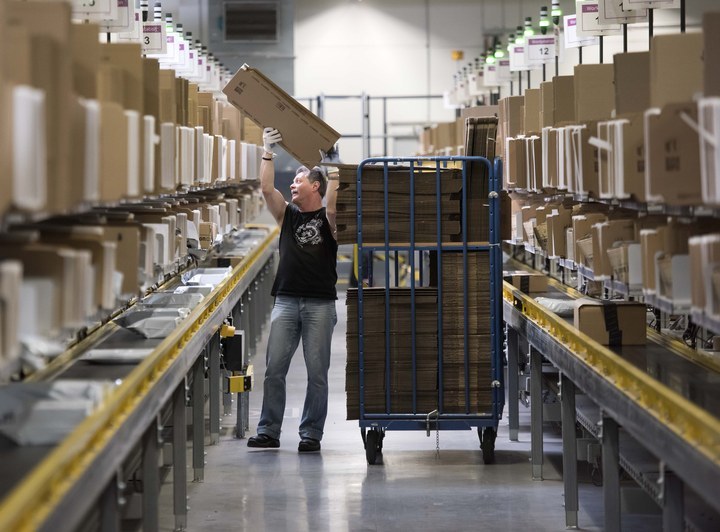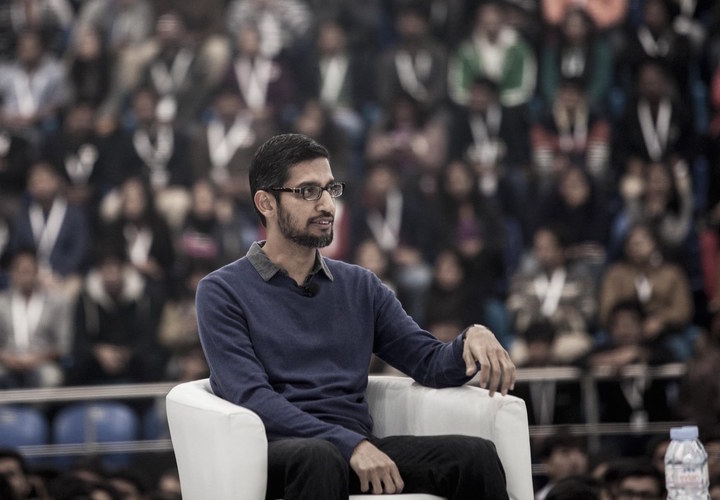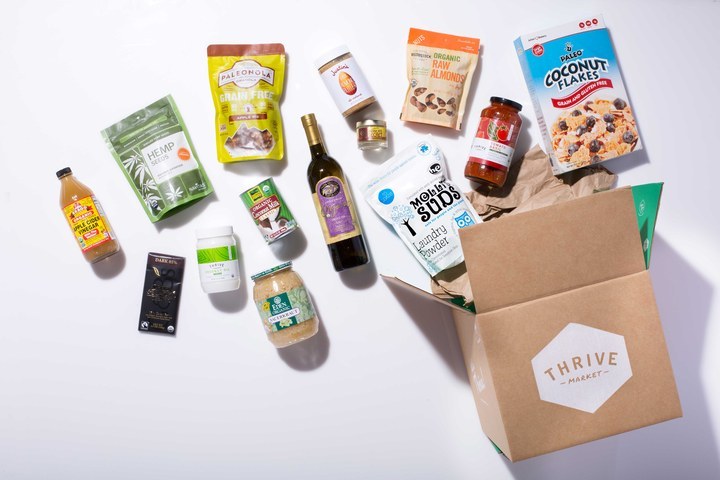via Future Tense - RSS text feed http://ift.tt/1pTTVFX
2016年4月30日 星期六
Great big boats in the sky
via Future Tense - RSS text feed http://ift.tt/1pTTVFX
Tech Q&A: Finding the best router, recovering deleted files
via FOX News http://ift.tt/1UnIZx5
2016年4月29日 星期五
Report: Google tests 'trips' planning app
via FOX News http://ift.tt/1O1h5Az
How Sex Toy Makers Sneak Around Digital Filters

Liz Klinger first started selling sex toys four years ago, as a host of Passion Parties, in-home sales events modeled on Tupperware parties — only instead of Tupperware, vibrators and lubricant were for sale.
The experience made Klinger, whose background is in design and marketing, interested in manufacturing sex toys herself. So she rounded up some friends from companies like Google and Amazon and started building a "smart vibrator" that uses sensors to intelligently analyze what’s happening during sex. Today she is the CEO of a startup called Lioness.
But if the Passion Parties made it easy to talk to women directly, selling online made it harder. Klinger, like other sex toy manufacturers, couldn't get the word out on Facebook and Instagram. They also can't raise money on Kickstarter, and struggle to sell their product on Amazon, thanks to those sites' rules about sexually explicit material.
“Vibrators — even vibrators that are positioned as a sexual health discovery product, as opposed to something that’s pornographic — have a really hard time” selling online, Klinger told BuzzFeed News. Which is why she, along with a handful of other savvy sex toy slingers, decided the best way to deal with these rules is to break them.
Like many people, I first heard about Lioness via an Instagram ad — which is weird, because Facebook, which owns Instagram, doesn’t allow adult companies to advertise on any of its platforms. ("Our ad policies don't allow companies to advertise adult products or services, which includes sex toys," a Facebook spokesperson told BuzzFeed News in an email.) But Klinger found a workaround.
Lioness shot a video of a woman reading positive customer feedback the company had received. The video doesn’t have any sexual images, which makes it less likely to get flagged. But the real trick was having Lioness’s Facebook page, which sponsored the ad, link not to the Lioness website, but to a Lioness YouTube account. The only way potential customers would even find the company’s website was by clicking on an annotation inside the YouTube video.
Another sex toy startup, Comingle, used a similar workaround (before shutting down in February due to lack of funds). Comingle itself didn't buy promoted posts — but Indiegogo, where the company raised the money to build its product, is a crowdfunding platform, not a sex toy sales platform, so it can promote whatever it wants. Comingle never gave Facebook a dime, but Indiegogo was able to circulate a post that promoted the Mod, Comingle’s vibrator.
Hiding behind another company with a slightly different mission is another way to make it onto Facebook. Diamond Products, the parent company of Jimmyjane — one of the biggest and best known brands in the alternative sex toy market — recently bought Sir Richard's Condoms, an all-natural contraceptives company so popular that it’s sold at grocers like Whole Foods.
“The reason I acquired the company is, it’s my Trojan horse,” Jimmyjane President Robert Rheaume said, laughing. “I can use condoms to advertise on Facebook and other social media feeds that don’t allow sexual toys.”
Both Facebook's and Twitter’s advertising policies have loopholes that allow contraceptives to be advertised, regardless of sexual content. Customers who click through a Sir Richard’s ad to the website can easily add Jimmyjane products to their cart before checkout, he said.
For most of these companies, finding the backdoor to Facebook was effective, even if it wasn’t preferable. According to Klinger, during the time the ads were up, Lioness saw a tenfold increase in sales though Indiegogo, without any press or other significant events. But, she said, “if you talk to someone in e-commerce, this is a really, really inefficient way of selling product.”
Facebook's and Instagram’s weren’t the the only algorithms Lioness and others like it had to beat. Getting the word out on social media is important, but if you want to sell goods to a mass audience, the obvious place to turn is Amazon.com. And that option is full of obstacles for sex toy makers.
Amazon does have a “sexual wellness” category, but sellers need to get “pre-approval,” which means selling 50 units of something else before they can start selling adult products. A representative from Amazon told BuzzFeed News that this policy is meant to ensure quality and customer satisfaction.
But that can be a tricky hurdle if all your company makes is vibrators. Alex Fine, CEO of Dame Products, cleared it by having 200 bumper stickers made that said, “My other car is a vibrator.” They sold well — but more important, they won Dame the Amazon page it wanted.
Even so, getting onto Amazon was just the start. The company also controls how sex toys show up in search results, to ensure that sex toys don't show up when that's not what the searcher is seeking. So, if you search "dildo" or "vibrator," sex toys are what you'll find. But if you search "Dame Eva" — the name of one of Dame's vibrators — you'll find cell phone cases emblazoned with Eva Longoria's face and albums by Dame Eva Turner.
"The reason I acquired the company is, it's my Trojan horse."
James Wang / Lioness
And there's a good reason for that — if you're shopping for a lemon squeezer, or a biography of Eva Perón, you probably don't want to be bombarded with a bunch of lemon-shaped vibrators.
But if you're a seller of sex toys, you don't want your potential customers to have to know where to look in order to find your products. Many of the search results when you just type "sex toy" into main search are from accounts selling brand-name sex toys, usually purchased wholesale, on the cheap. If they move enough product and get high enough ratings, they’ll ultimately get top placement in Amazon search results, outranking the companies that actually make the toys.
To get around the rule that keeps them out of main search, some of the sex toy companies try framing their product postings in a way that makes them appear unlike sex toys — Revel Body's Robert Elenga said he would label the vibrators as sports massagers, muscle massagers, or yoga massagers, and sell them along with a water bottle. But many end up getting flagged as adult products in the end anyway.
“It's almost a full-time job just to manage your listing,” Elenga told BuzzFeed News. And in fact, recently, Elenga got out of the sex toy game — sort of. Instead of selling vibrators to consumers, his new plan is to license RevelBody’s vibrating motor technology to smartphone and smartwatch manufacturers, as well as other sex toy companies.
Between Facebook’s terms of service, SafeSearch in browsers, and various other algorithm-driven impediments, it was just too much work to get the word out about Revel, Elenga said. “There's layers and layers of filters that block getting your content out,” he said.
Soumyadip Rakshit / MysteryVibe
Minna Life is best known for the Limon, a couples vibrator, but about a year ago, it came out with kGoal, a device that’s supposed to help women strengthen pelvic floor muscles. (There’s a version for men that will hit markets soon.) Minna CEO Brian Krieger said the kGoal is decidedly not a sex toy, which is helping Minna grow brand recognition on platforms where it wouldn’t normally be seen.
“We were definitely aware that if we broadened our purview a little bit it would strengthen our ability to argue with somebody like a Facebook,” Krieger said. Indeed, kGoal launched on Kickstarter, which doesn’t normally allow sex toys or other “pornographic materials.” Minna Life was also able to run an advertising campaign for kGoal on Facebook for a few months before getting flagged by the site and, ultimately, deactivated — but not before scoring a distribution deal with Target.com.
Krieger isn’t the only sex toy entrepreneur strengthening his brand with kegels. OhMiBod CEO Brian Dunham said his company has actually been selling kegel-exercising devices for years. But only the newest model, the “Krush,” vibrates and pairs with an app. This year, it won best in show in health and wellness at the Consumer Electronics Show.
Dunham said he was denied when he first applied for entrance to CES six years ago. Now, he plans to use his company’s victory there to continue pushing vibrators in spaces where they’re technically not allowed. When the Krush launches in May, it will launch under a new LoveLifeToys brand, which Durham plans to promote on Facebook and other channels. “It will be a great litmus test if Facebook shuts us down,” he said.
There are plenty of other ways to advertise sex toys online. Lelo uses blog posts that get shared on social media. Mysteryvibe syndicates content through a British media company called Unruly. But at the end of the day, the best way to get around content filters and terms of service might be satisfied customers, said Michael Topolovac, CEO of a sex toy company called Crave.
"If a customer says a product is great, they don't filter that out,” he said, “because that's free speech."
via BuzzFeed - Tech http://ift.tt/23ensr2
Do You Know What Happened In Tech News The Week Of April 25?
iPhone sales slowed, Beyoncé picked her streaming service of choice, and Facebook started broadcasting sports. Take the tech news quiz for the week of April
via BuzzFeed - Tech http://ift.tt/26BMmp3
The NSA doesn't even know how many Americans it's spying on
via FOX News http://ift.tt/1N7Dyky
The New MacBook Is A Sexy, Slim, Cable-Guzzling Monster

Probably the best-looking laptop you’ve laid your eyes on.
Jenny Chang / BuzzFeed / Via Apple
Apple recently introduced its second-generation MacBook.
No, it's not an update to the powerful-yet-portable MacBook Pro, or the highly-competent, compact MacBook Air. The latest Apple lappy, fitting to its ~minimalist aesthetic~, is just called “MacBook."
For the uninitiated, the MacBook is probably the most attractive laptop ever. But it's for a very specific kind of computer-er (and a very particular kind of budget).
Aside from a new rose gold model (which is really just PINK), the updated 2016 MacBook is superficially the same as last year’s, but there are a few key improvements to its speed and battery life. Apple loaned me a review unit to take its new suped-up MacBook to the limit.
So, should you buy this laptop? Should you buy a laptop at all?? Read on.
Will M. / Nicole Nguyen / BuzzFeed
via BuzzFeed - Tech http://ift.tt/1NGe1Pb
Hands On: New Roku Streaming Stick
via FOX News http://ift.tt/24pvijW
SCOTUS Approves Rule Change to Expand FBI Hacking Power
The U.S. Supreme Court approved a measure on Thursday that would allow judges to issue warrants for computer searches in any jurisdiction. Civil liberties groups say it unnecessarily expands the FBI's hacking...
Photo Credit: Getty Images
via NBC Chicago - Tech News http://ift.tt/1TjvklN
New Horizons team proposes new world to explore
via CNN.com - Technology http://ift.tt/1N6ZOLi
Apple's latest patent hopes to put an end to autocorrect fails
via FOX News http://ift.tt/24pmuus
Report: Government requests for Facebook data on the rise
via FOX News http://ift.tt/1SP43KK
Powerful lasers fired up for space exploration
Podcast favorites: Blindsided: How ISIS Shook The World | Bernie gets the Axe | Guns in America
via CNN.com - Technology http://ift.tt/24oSC1h
Zuckerberg spent $19m on personal security over past three years
via FOX News http://ift.tt/23cQB5P
2016年4月28日 星期四
Amazon Is Reporting Profits For A Change, And Investors Love It

Jens Meyer / AP
Amazon sold a lot of stuff in the first three months of this year, more than analysts expected. But Amazon always sells a lot of stuff. What's changing is how much profit it chooses to make while doing so.
The company reported a $513 million profit for the quarter, up from a $57 million loss in the same period last year. It was almost double what analysts had expected, and was close to the $596 million the company earned in all of 2015. In 2014 it made a $241 million loss.
The unexpectedly large profit came from revenues of $29.1 billion, up 28% from the first quarter last year and higher than the $28 billion predicted by analysts polled by Bloomberg.
And not only is the company making big profits — this time around, investors are happy with it for doing so, with Amazon stock rising over 12% in after-hours trading. When the online retailer reported a record profit in its previous quarter, its stock crashed.
The stock may be rallying thanks to aggressive projections for sales growth that Amazon released alongside results on Thursday. It expects revenues between $28 billion and $30.5 billion, while analysts expected second quarter revenues at just over $28 billion.
Amazon/BuzzFeed
Amazon Web Services, its cloud computing business, is still growing like crazy. It had revenues of $2.6 billion, up 64% from a year ago, and above the $2.5 billion that analysts forecasted. The division's operating income of $604 million was over triple the $195 million it earned a year ago. Amazon's total operating income, which is a slightly different measure from net income or profits, was $1.1 billion.
via BuzzFeed - Tech http://ift.tt/26ylWVa
In His First "Founder's Letter," Sundar Pichai Charts Google's Future

Vivek Singh for BuzzFeed News
In his inaugural "founder's letter" — Google's version of a State of the Union — newly minted CEO Sundar Pichai laid out his vision of the company's future, stressing that change is on the way, and Google wants to be all-in on the artificial intelligence revolution when it arrives.
"The next big step will be for the very concept of the “device” to fade away," Pichai writes. "Over time, the computer itself — whatever its form factor — will be an intelligent assistant helping you through your day. We will move from mobile first to an AI first world. [Artificial intelligence] can help us in everything from accomplishing our daily tasks and travels, to eventually tackling even bigger challenges like climate change and cancer diagnosis."
Pichai's letter also serves as a brief highlight reel of Google's past year; Pichai references Google's AlphaGo artificial intelligence beating a world champion at the strategy game, Google Photos (which relies heavily on Google's AI strengths) reaching 100 million users in less than a year, and having over 1.4 billion active Android devices in the market.
This is Pichai's first time penning Google's annual "founder's letter." For every year since its formation, that's been handled by the company's co-founders, Larry Page and Sergey Brin. However, when Google restructured last year into Alphabet and Google, they handed over the Google reins and role of CEO to Sundar Pichai.
"Since the majority of our big bets are in Google, I wanted to give him most of the bully-pulpit here to reflect on Google’s accomplishments and share his vision," writes Page in a brief foreword to Pichai's letter. He goes on to write that he, Brin, and Pichai will likely all make these announcements moving forward.
In addition to mapping where Google is going, and what it's accomplished lately, Pichai also included the high-minded, inspirational rhetoric expected from tech CEOs in 2016. "For us, technology is not about the devices or the products we build. Those aren’t the end-goals. Technology is a democratizing force, empowering people through information," writes Pichai. "Google is an information company. It was when it was founded, and it is today. And it’s what people do with that information that amazes and inspires me every day."
You can read the full founder's letter here.
via BuzzFeed - Tech http://ift.tt/1NDPtX5
This Startup Wants To Beat Whole Foods At Online Delivery

Thrive Market
It’s been a rough few months for tech-enabled delivery startups. Just ask Instacart, which recently cut pay for contract drivers in several cities and raised its prices. Or DoorDash, which last month raised money at a reportedly lowered valuation. Or SpoonRocket, which shut down its meal delivery service in March. Or any of the many venture-backed startups — Blue Apron, Gobble, Hello Fresh, Munchery, Plated, Good Eggs — that are facing an increasingly crowded market for grocery, pre-cooked-meal, and meal-kit delivery.
Thrive Market, an organic food and beauty product startup in Los Angeles, thinks it’s found a way in by doing key things differently compared to some of its competitors.
First off, it doesn’t touch fresh food. It also doesn’t rely on independent contractors to bring goods to your door within hours, the way Postmates, Instacart, DoorDash, and GrubHub fully or partly do.
Thrive describes itself as a mix of Whole Foods and Costco, a business that taps into the customer demand for organic food and lifestyle products that has also propelled startups like Jessica Alba’s the Honest Company — products that are normally associated with higher prices.
A $60 annual membership (that’s the Costco element) gives you access to Thrive’s online marketplace of 4,000 non-perishable food items, baking ingredients, bath and beauty products, nutritional supplements, and home supplies, which are marketed as gluten-free, paleo-friendly, organic, and so on, just like at Whole Foods. But executives say Thrive’s products cost around 25% to 50% less because the company buys them in bulk at discounted prices, and doesn’t need to foot the bills for brick-and-mortar retail stores.
“Only the top 3–5% of consumers can afford that premium,” Thrive Co-CEO Nicholas Green said of Whole Foods. “We’re focused on the 90% to 95% of American families. They’re not thinking about getting fresh food delivered — they’re thinking about shopping on a budget for the healthiest products they can.”
CEOs Gunnar Lovelace and Nicholas Green
Thrive Market
If Thrive’s leaders are to be believed, the company has been doing well since it was founded in 2013 and launched its service in November 2014 — and its self-reported figures stand out against the layoffs and other gloomy developments recently making rounds in the delivery world. Thrive’s revenue last year reached $50 million; monthly sales now exceed $10 million and are reportedly growing at a “double-digit” rate. There are more than 200,000 paying members, 30,000 of whom joined in March and 28,000 in February, the company told BuzzFeed News. There were also 432,000 new registered users in March. (People who register for free can browse the site and get a discount off their first purchase.)
The company says it has raised $58 million from investors that include Demi Moore and John Legend. Thrive isn’t profitable, however, and is at the moment more focused on bringing on as many new customers as possible. It makes shipping free for orders over $50 — the CEOs say the cost is absorbed into the cost of membership — and rolled out iOS and Android apps this spring.
Still, the CEOs say, Thrive works because it has annual subscriptions, which help the company predict how much revenue will be coming in, and with a greater degree of reliability than occasional or one-time purchases. And because Thrive’s inventory — grains, pasta, nuts, cookies, almond butter, soap, vitamins — can be stored for weeks without going bad, the company can waste less and make better predictions about what it will need. Perishability is a complex logistical problem that has challenged organic food supplier Good Eggs, which last year closed its hubs outside San Francisco and laid off nearly 140 employees.
So Thrive doesn’t need to rush to get products out before they spoil — and its products aren’t things that people typically need immediately, either, but rather every few weeks or months. Last fall, it introduced its own, private-label organic tomato sauce and coconut oil.
“A lot of people want to buy their avocados and bananas in person and see if the items are ripe or fresh,” Green said. “The nice thing about non-perishable (items) is they’re stable, you don’t need to touch them to make a decision. The only reason they’re sold in a grocery store is it’s a vestige of a time before grocery stores.”
Thrive Market
All this stuff is stored in a 40,000-square-foot warehouse in Los Angeles, and a newer 375,000-square-foot, ex-General Electric plant in Batesville, Indiana. A total of about 400 workers — W-2 employees with benefits — receive inventory, fill orders, and ship them off via UPS, which delivers within a few days. Co-CEO Gunnar Lovelace and Green say that for the kind of work their employees do, using independent contractors didn’t make sense.
Before Thrive, Lovelace started and sold two software companies. He grew up with a single mother who “struggled to make healthy choices,” he said, and remarried a man who ran a food co-op out of an organic farm in Ojai, California. Learning about that system would later drive him to get into the organic-goods business and try to make it affordable: For every paying member who signs up, Thrive gives away a membership to a low-income family, and in January, it started allowing shoppers to donate store credit to other Thrive shoppers in need. (Customers have chipped in $156,000 so far.) Green, who’d sold an education startup he’d started in college, had initially wanted to invest in Thrive, but decided to join Lovelace as a co-founder.
Thrive’s success so far is due to the fact that it’s tapped into a market beyond wealthy coastal cities — “people that Whole Foods just isn’t even close to and won’t be, at least not for the foreseeable future,” as Greycroft Partners co-founder and partner Dana Settle, an investor in Thrive, put it to BuzzFeed News. A spokesperson for Whole Foods did not return a request for comment.
Greycroft also invests in on-demand meal startup Munchery and meal-kit subscription service Plated. But Settle doesn’t necessarily see them as competing with each other.
“The market for food is just enormous,” she said. “There’s opportunity and room for multiple players that do different things and appeal to different consumers, and sometimes the same consumers for different reasons.”
Thrive Market
via BuzzFeed - Tech http://ift.tt/1WVe382
This humanoid robot diver is a submersible avatar
via FOX News http://ift.tt/1Wtmw1N
Verizon claims sabotage on network and cables
via FOX News http://ift.tt/1Tgb5FF
India to require panic buttons on phones
via FOX News http://ift.tt/24lQR4W
Making sense of Apple now that everything has changed
via FOX News http://ift.tt/1Wsm43X
Apple’s Newest App Tool Helps You Keep Tabs On Your Health

Dolgachov / Getty Images
Over the last two years, Apple has sought to turn the iPhone and the Apple Watch into health-tracking devices through which people track and record some of their most important — and intimate — data. Early Thursday, Apple officially launched CareKit, a new app-building tool meant to help people more easily connect with health care providers even more frequently.
Announced at Apple’s iPhone event last month, CareKit is an open-source framework, a sort of scaffolding for app functions that let patients track and measure their symptoms, check off to-do lists assigned by their doctors, and send their health data to clinicians. Developers can use the tool to create apps from scratch or add new features to existing apps.
A few companies were given a CareKit head-start with Apple’s blessing and are incorporating elements of the tool into app updates released today. The programs intend to help people manage diabetes (One Drop), track the effects of antidepressant medications (Start), and monitor pregnancies and newborn health and development (Glow Nurture and Baby). The University of Rochester also has one dedicated to Parkinson's disease, and still others are in the works by institutions like Texas Medical Center, Cleveland Clinic, and Beth Israel Deaconess Medical Center.
Glow, a startup that makes women’s health apps, used CareKit to enable Nurture and Baby users to easily email PDF updates about their prenatal health and babies’ growth to gynecologists and pediatricians. “CareKit can help accelerate the ability to harness information and put it in the hands of consumers and ultimately relay that back to their health care providers,” Jennifer Tye, Glow’s vice president of marketing and partnerships, told BuzzFeed News.
One Drop
Apple
And Start lets people record their physical and mental reactions to antidepressants, determine whether they working over time, and email progress reports to doctors. With the new CareKit functions, they can also do things like check off that they’ve taken their daily dose and receive report submission reminders. Start was launched last year by Iodine, a startup that’s been called the “Yelp of medicine” for its searchable library of crowd-reported drug side effects.
Although CareKit’s PDF reports don’t seamlessly sync with hospitals’ electronic health records, they do handle the important task of presenting crucial information in an easy-to-read-way, said Iodine CEO Thomas Goetz. “It solves this problem we’ve been wrestling with … as we’ve been working with clinical partners: ‘How do we get our data into your system?’” he told BuzzFeed News. “CareKit makes that process very intuitive for the user.”
Apple isn’t the only tech company with an expanding presence in the increasingly digital world of health and wellness. This month, developers funded by the Robert Wood Johnson Foundation released ResearchStack, an Android app framework that allows people to remotely participate in clinical studies. It is the Android equivalent of ResearchKit, the iOS app framework released in March 2015.
Google said last fall that there are 1.4 billion active Android devices worldwide. But Apple also has more than 1 billion active devices to brag about, and unlike Google, it controls the manufacturing of all its products.
So any extra reason for people to open their iPhones is a win in Apple’s war for customer loyalty — and CareKit is yet another reason for patients to keep coming back to iOS. During an earnings call Tuesday, CEO Tim Cook mentioned that the company is “very excited about the ways iPhone and Apple Watch are helping people lead healthier lives.” “We believe there's great promise here for the future,” he added, “and we are very interested in where this can take us.”
Apple Chief Operating Officer Jeff Williams announcing CareKit.
Justin Sullivan / Getty Images
via BuzzFeed - Tech http://ift.tt/24lCFJo